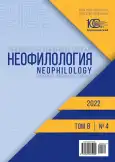Folk patois through the prism of the funeral and memorial rite
- Authors: Nedostupova L.V.1
-
Affiliations:
- Voronezh State Technical University
- Issue: Vol 8, No 4 (2022)
- Pages: 715-723
- Section: RUSSIAN LANGUAGE. LANGUAGES OF PEOPLES OF RUSSIA
- URL: https://journal-vniispk.ru/2587-6953/article/view/301680
- DOI: https://doi.org/10.20310/2587-6953-2022-8-4-715-723
- ID: 301680
Cite item
Full Text
Abstract
The topic of this study is the content of the ritual of organizing and conducting a funeral, which is reflected in the living language of a rural person. The applicability of this research is due to the growing interest in the folk culture of the past and the vocabulary associated with it. The purpose of the research is to determine the characteristic features of the speech of a dialect speaker of the older age group through the prism of the funeral and memorial rite of the Russian village. The old tradition is represented through the folk language. The object of research is the South Russian patois. As a result of research activity, we show the ceremonial of the mourning cycle of the middle of the 20th century. It is presented as an original cultural phenomenon, including 12 stages of action. The patois of a village woman is analyzed through bright phonetic and grammatical features. Among them: ya-pronunciation, a-pronunciation, i-pronunciation, transition [a] to [o], γ fricative formation, loss of initial vowel and consonant, use of prosthetic [й] before front vowel [и], hard pronunciation of long hissing [ш’], regular dissimilation, simplification of consonants and vowels or their groups, lengthening of the stem due to a vowel and/or consonant, rearrangement of stress in words, transition of nouns of the 3rd declension into the 1st, endings -ы in words of the neuter gender, transition of the neuter gender into female, etc. It is concluded that these characteristics testify to the preservation of dialectal features through a strong, steadfast custom of the last century. It is noted that in the respondent's speech they found expression: ritual tradition, ritual food and drinks, the life of a particular person, rural realities, features of life, family relations, norms existing within the village microcommunity, etc.
Keywords
About the authors
L. V. Nedostupova
Voronezh State Technical University
Author for correspondence.
Email: nedostupowa2009@yandex.ru
ORCID iD: 0000-0003-1978-4725
Candidate of Philology, Associate Professor, Associate Professor of Russian Language and Intercultural Communication Department
14 Moskovskiy Ave, Voronezh 394026, Russian FederationReferences
- Nedostupova L.V. Yazyk svadebnoy tseremonii kak otrazheniye sel’skoy narodnoy kul’tury [The language of the wedding ceremony as a reflection of rural folk culture]. Sovremennyye lingvisticheskiye i metodikodidakti-cheskiye issledovaniya – Modern Linguistic and Methodological-Didactic Research, Voronezh, 2022. no. 1 (53), pp. 64-79. http://doi.org/10.36622/VSTU.2022.74.65.005. (In Russian).
- Filatova V.F. Obryad i obryadovaya leksika v etnolingvosemioticheskom aspekte (na materiale govorov vos-tochnoy chasti Voronezhskoy oblasti): avtoref. dis. … kand. filol. nauk [Rite and Ritual Vocabulary in the Ethno-Linguo-Semiotic Aspect (Based on the Dialects of the Eastern Part of the Voronezh Region). Cand. philol. sci. diss. abstr.]. Voronezh, 1995, 22 p. (In Russian).
- Filatova V.F. Triada rozhdeniye – zhizn’ (brak) – smert’ v obryadakh Voronezhskoy oblasti (opyt lingvosemi-oticheskogo opisaniya obryada) [The triad of birth – life (marriage) – death in the rites of the Voronezh region (the experience of the linguo-semiotic description of the rite)]. Opyt issledovaniya traditsionnykh obryadov Vo-ronezhskogo kraya [Experience in the Study of Traditional Rites of the Voronezh Region]. Borisoglebsk, 1998, pp. 14-53. (In Russian).
- Filatova V.F. O magicheskikh obryadakh i ikh sovremennom sostoyanii (na materiale russkikh i ukrainskikh voronezhskikh govorov) [About magical rites and their current state (on the material of Russian and Ukrainian Voronezh dialects)]. Leksicheskiy atlas russkikh narodnykh govorov 1999 [Lexical Atlas of Russian Folk Di-alects 1999]. St. Petersburg, 2002, pp. 115-123. (In Russian).
- Filatova V.F. Leksika arkhaicheskikh elementov pogrebal’no-pominal’nogo obryada Voronezhskogo kraya [Vocabulary of archaic elements of the funeral and memorial rite of the Voronezh region]. Leksicheskiy atlas russkikh narodnykh govorov 2021 [Lexical Atlas of Russian Folk Dialects 2021]. St. Petersburg, 2021, pp. 533-551. (In Russian).
- Krasheninnikova Yu.A. Pokhorony «po-repnomu» (o nekotorykh faktakh pokhoronno-pominal’noy obryad-nosti severnykh russkikh) [Burials “in turnip” (about some facts of the funeral and memorial rituals of Northern Russians)]. Antropologicheskiy forum – Anthropological Forum, 2009, no. 10, pp. 299-310. (In Russian).
- Kolkova N.A. Russkaya pogrebal’naya paremiologiya i frazeologiya v lingvokognitivnom aspekte: smert’ kak stsenariy ukhoda [Russian funerary paremiology and phraseology in the linguo-cognitive aspect: death as a scenario of departure]. Mir russkogo slova – World of the Russian Word, 2009, no. 3, pp. 59-63. (In Russian).
- Kokonova A.B. Rozhdeniye i smert’ v prostranstve dialekta: avtoref. dis. … kand. filol. nauk [Birth and Death in the Space of a Dialect. Cand. philol. sci. diss. abstr.]. Moscow, 2011, 24 p. (In Russian).
- Andryunina M.A. Simvolika prostranstva v slavyanskoy pokhoronno-pominal’noy obryadnosti: etnolingvisti-cheskiy aspekt: avtoref. dis. ... kand. filol. nauk. [The Symbolism of Space in the Slavic Funeral and Memorial Rites: Ethnolinguistic Aspect. Cand. philol. sci. diss. abstr.]. Moscow, 2015, 24 p. (In Russian).
- Bobrikhin A.A. Semantika pokhoronnogo obryada ural’tsev [Semantics of the funeral rite of the Urals]. Nat-sional’nyye kul’tury Urala. Fol’klornyy tekst i obryad [Nationalnye Cultures of the Urals. Folklore Text and Rite]. Yekaterinburg, Center of Traditional Folk Culture of the Middle Urals Publ., 2016, pp. 14-34. (In Russian).
- Podyukov I.A., Svalova E.N. Lokal’naya spetsifika leksiki pokhoronno-pominal’noy obryadnosti russkikh Pri-kam’ya [Local specificity of the vocabulary of the funeral and memorial rituals of the Russians of the Kama region]. Nauchnyy dialog – Scientific Dialogue, 2019, no. 11, pp. 46-60. http://doi.org/10.24224/2227-1295-2019-11-46-60. (In Russian).
- Nedostupova L.V. Reprezentatsiya svadebnoy traditsii 60-kh gg. XX stoletiya v Voronezhskoy oblasti (etno-lingvisticheskiy aspekt) [Representation of the wedding tradition of the 60s. of 20th century in the Voronezh region (ethno-linguistic aspect)]. Vestnik slavyanskikh kul’tur – Bulletin of Slavic Cultures, Moscow, 2022, vol. 63, pp. 55-75. http://doi.org/10.37816/2073-9567-2022-63-55-75. (In Russian).
Supplementary files









